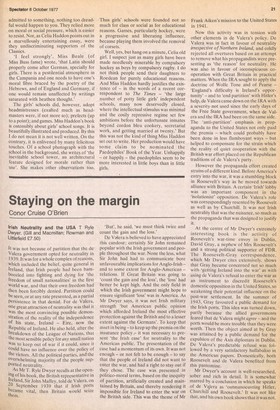Staying on the margin
Conor Cruise O'Brien
Irish Neutrality and the USA T Ryle Dwyer. (Gill and Macmillan; Rowman and Littlefield £7.50) It was not because of partition that the de Valera government opted for neutrality in 1939. It was for a whole complex of reasons, Which included the belief, quite general in Ireland, that Irish people had been bamboozled into fighting and dying for 'the freedom of small nationalities' in the first world war, and that their own freedom had then been forcibly denied. Partition could be seen, or at any rate presented, as a partial persistence in that denial. For de Valera, one great attraction of neutrality was that it was the most convincing possible demonstration of the reality of the independence Of his state, Ireland — Eire, now the Republic of Ireland. He also held, after the breakdown of the League of Nations, that the most sensible policy for any small nation Was to keep out of war if it could, since it could have no influence over the policy of the victors. All the political parties, and the overwhelming majority of the people supported neutrality. As Mr T. Ryle Dwyer recalls at the opening of his book, the British representative in Ireland, Sir John Maffey, told de Valera, on 20 September 1939 that if Irish ports became vital, then Britain would seize them, 'But', he said, 'we must think twice and count the gain and the loss.'
De Valera is believed to have appreciated this candour; certainly Sir John remained popular with the Irish government and people throughout the war. None the less, what Sir John had had to communicate bore unfavourable implications for Anglo-Irish — and to some extent for Anglo-American — relations. If Great Britain was going to 'count the gain and the loss', the 'loss' had better be kept high. And the only field in which the Irish government might hope to ensure significant 'loss' was in America. As Mr Dwyer says, it was not Irish military strength 'but American public opinion which afforded Ireland the most effective protection against the British and to a lesser extent against the Germans'. To keep that asset in being— to keep up the premia on the insurance policy it was necessary to present 'the Irish case' for neutrality to the American public. The presentation of the case had a momentum of its own. It was not enough — or not felt to be enough — to say that the people of Ireland did not want to enter the war, and had a right to stay out if they chose. The case was presented in politico-moral terms, based on the inequity of partition, artificially created and maintained by Britain, and thereby rendering it impossible for Ireland to enter the war on the British side. This was the theme of Mr Frank Aiken's mission to the United States in 1941.
Now this activity was in tension with other elements in de Valera's policy. De Valera was in fact in favour of neutrality irrespective of Northern Ireland, and coldly rejected all overtures based on an attempt to remove what his propagandists were presenting as 'the reason' for neutrality. He was also in favour of inconspicuous cooperation with Great Britain in practical matters. When the IRA sought to apply the doctrine of Wolfe Tone and of Pearse — 'England's difficulty is Ireland's opportunity' — and to 'end partition' with Hitler's help, de Valera came down on the IRA with a severity not used since the early days of the Free State government, when de Valera and the IRA had been on the same side. The 'anti-partition' emphasis in propaganda to the United States not only paid the premia — which could probably have been done in less flamboyant ways — but helped to compensate for the strain which the reality of quiet cooperation with the British war effort placed on the Republican traditions of de Valera's party.
However the propaganda effort created strains of a different kind. Before America's entry into the war, it was a stumbling block in Roosevelt's way as he moved towards alliance with Britain. A certain 'Irish' lobby was an important component in the 'isolationist' opposition. De Valera's role was correspondingly resented by Roosevelt as well as by Churchill. It was not Irish neutrality that was the nuisance, so much as the propaganda that was designed to justify It.
At the centre of Mr Dwyer's extremely interesting book is the activity of Roosevelt's war-time envoy in Dublin, David Gray, a nephew of Mrs Roosevelt's and a strong political supporter of FDR. The Roosevelt-Gray correspondence, which Mr Dwyer cites extensively, shows that Gray became concerned not so much with 'getting Ireland into the war' as with using de Valera's refusal to enter the war as an instrument to discredit Roosevelt's domestic opposition in the United States, so weakening their potential influence on the post-war settlement. In the summer of 1943, Gray favoured a public demand for the Irish ports. This idea was turned down, partly because the allied governments feared that de Valera might agree — and the ports would be more trouble than they were worth. Then the object aimed at by Gray was attained by a public demand for the expulsion of the Axis diplomats in Dublin. De Valera's predictable refusal was followed by a very satisfactory hullabaloo in the American papers. Domestically, both Roosevelt and de Valera benefited from this pantomine.
Mr Dwyer's account is well-researched, sober and rich in detail. It is ,somewhat marred by a conclusion in which he speaks of de V:tlera as 'own) noeuvring Hitler, Churchill and Roosevelt.' It was not like that, and his own book shows that it was not.


































 Previous page
Previous page